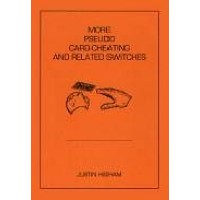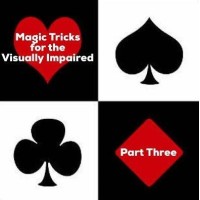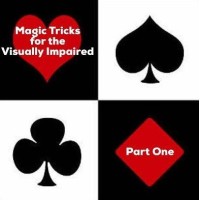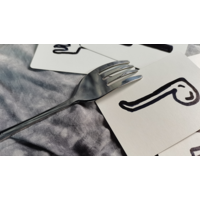Dariel Fitzkee - Magic By Misdirection
- Product Code: B3#232
- Reward Points: 15
- Availability: In Stock
- $11.00
-
$3.99
- Price in reward points: 399
This volume, book three in the trilogy, is all about the psychology in magic. Mechanics alone, a sleight or move, are not sufficient to produce a strong magic effect. Dexterity by itself is more like juggling. Only if misdirection, the psychological aspect of deception, is added into the mix, will one be able to create a truly magic experience.
There aren't many good works on misdirection. This is one of the must read ebooks, a classic in the theory of magic. A shorter but modern discussion of misdirection can be read in Pocket Power by Jarle Leirpoll.
- INTRODUCTION
- Which is the cart and which is the horse
- Exposing the wheels
- Made to measure tricks
- Hand-me-downs in magic
- Are the classics best?
- What makes a trick great?
- Life
- Seven corpses
- Peregrinating professors
- A "classic" is born
- Classics, capability and cads
- Blockbusting old ideas
- The spectator's think-tank
- Seeing and believing
- CHAPTER I - REAL SECRETS OF MAGIC
- Taking up where we left off
- New gods for old
- Exposing the exposure
- Skill or duffer
- Giving the bird to the bird cage
- Aren't we all duffers?
- Ignoring the important
- True skill
- The real secrets of magic
- False whiskers and attention
- True or false
- CHAPTER II - THE IMPORTANCE OF INTERPRETATION
- More of the same
- Exposure is impossible
- Can you read a magician's mind?
- The performer paints his own picture
- Interpretation to confound
- Conviction
- By these signs ye shall know them
- Acting
- Diebox deception
- CHAPTER III - CONVICTION AND NATURALNESS
- The important ingredients
- If you believe it, it's so
- Convince yourself
- Spectator instinct
- Naturalness
- How to convince without argument
- Disguise and attention
- Attention control comes forward
- Reasons
- The importance of convincing yourself
- CHAPTER IV - WHAT ACTUALLY DECEIVES THE SPECTATOR
- Money to burn
- Marked and borrowed, but found in an impossible place
- Behind the scenes
- The plant
- Pilferage
- Disappearing rubber
- No machinery necessary
- All through psychology
- The spectator's viewpoint
- Disguise and attention
- Money cheerfully refunded
- CHAPTER V - THE PSYCHOLOGICAL EXPEDIENTS
- Through the microscope
- Simulation
- Dissimulation
- Interpretation
- Maneuver
- Pretense
- Ruse
- Anticipation
- Disguise
- Diversion
- Monotony
- Premature consummation
- Confusion
- Suggestion
- Disguise plus disguise plus attention control
- And more of the same
- CHAPTER VI - REACHING THE SPECTATOR'S MIND
- The attack on the spectator's understanding
- External appearances and interpretation
- Suggestion and implication
- Danger in the direct statement
- You can't force the spectator's conclusions
- Inducement and persuasion
- Confusion with a bank note
- Deduction versus induction
- CHAPTER VII - PROCESSES WITHIN THE SPECTATOR'S MIND
- The spectator must be deceived
- The spectator's perceptions
- The mind, only, perceives
- The spectator's consciousness
- Magicians must attack the spectator's understanding
- Mind stimuli and idea association
- The spectator's mind is not a pushover
- He is consciously intelligent
- Details do the trick
- CHAPTER VIII - THE IMPORTANCE OF THE NORM
- How the spectator views the performer's appearance
- The important norm
- Discord brings damaging attention
- Characteristic naturalness
- Bewilderment not deception
- Disguise
- Dice and rabbits
- Palming a card
- Diversion
- The importance of naturalness
- CHAPTER IX - THE NORM IN SPEECH
- Speech in deception
- The norm in speech patterns
- Variations "telegraph"
- What as well as how
- Subject matter norm
- Undue emphasis
- The strength of implication
- An example with bonds
- With tubes
- The norm in attitude
- What magic really is
- Imitation magic
- Speech in attention diversion
- The scorched thumb
- Any solution destroys deception
- Things important to the magician
- CHAPTER X - THE NORM IN PROPERTIES
- Properties in deception
- Familiar things accepted more quickly
- Handling for deception
- A lesson from Kellar
- Pulling the lesson apart
- Applying the Kellar lesson
- Tricky appearance destroys deception
- A general idea satisfies the spectator
- Strengthening deception by appearance of properties
- CHAPTER XI - DISGUISE AND ATTENTION CONTROL
- The magician has but two courses
- Disguise and attention control
- With a changing bag
- How important does it seem to the magician?
- Substituting a stronger interest
- Disguise in many forms
- Physical and psychological disguise
- Frames, stocks, bottles and miscellany
- The effectiveness of mixing the true with the false
- A magician's tool does not deceive
- Disguising the tool
- CHAPTER XII - SIMULATION
- Harping on an old obsession
- The true spectator response
- We can only baffle
- Seeing versus thinking
- Simulation
- The necessary support to simulation
- Bowls, egg bags, cigarettes, cards, ropes, turbans, billets, rings, eggs
- Ultimately all is acting
- CHAPTER XIII - DISSIMULATION
- Dissimulation
- Acting again
- Special decks
- Preparing for dissimulation
- More rising cards
- Bottles, clocks, production boxes, egg bags
- Dissimulation with cards
- Distinctions
- Many disguises
- CHAPTER XIV - MANEUVER
- Maneuver for deception
- An example with bottles
- A routined series of movements
- Maneuver with cards
- Maneuver as used by Al Baker
- The distinction
- CHAPTER XV - RUSE
- The ruse in deception
- Purposes disguised
- With billiard balls
- With tied thumbs
- Ruse with card sleights
- In a divination effect
- Illusions, cards, silks
- CHAPTER XVI - SUGGESTION AND INDUCEMENT
- Disguise in many forms
- Suggestion and inducement
- Disguised force
- The hypnotic process
- In mind reading
- Breaking a pencil
- Oranges, bills, bells, beads, pegs, balls
- CHAPTER XVII - ATTENTION CONTROL
- Attention control
- Misdirection
- Many forms of control
- Anticipation
- Premature consummation
- Monotony
- Confusion
- Diversion
- Specific direction
- Anticipation with cards
- Varied examples
- Tricks and illusions with attention control
- CHAPTER XVIII - ANTICIPATION
- Spectator attention
- The manner of controlling attention
- To accomplish interest
- Suspense
- Animation
- Detail on attention control
- Anticipating the attention
- Cups, balls, cards, running up decks
- Fire and water
- CHAPTER XIX - RELAXATION, MONOTONY, CONFUSION
- Premature consummation and Kellar's use of it
- Stephen Shepard and his bird cage
- Stripped of all illusions
- With six silk handkerchiefs
- The performer must set the pattern for the spectator
- Thought force is concrete
- The language of the mind
- Monotony
- Examples by Leslie Guest
- Confusion
- Balls, finales, rings, pellets, coins
- Confusion a la Blackstone
- Keep it quiet
- CHAPTER XX - DIVERSION AND DISTRACTION
- Diversion for deception
- With a handkerchief and a wine glass
- Details
- The power of suggestion
- Specific detail
- The most subtle stratagem
- Its mechanics
- Bowls, hat loads, cards, eggs, chickens
- Leslie Guest again
- With a rabbit
- Distraction
- Beware repetition
- Clocks, girls, trunks
- CHAPTER XXI - SAMPLES OF ATTENTION CONTROL
- Attention control stratagems in action
- Stephen Shepard and a tall glass
- Madison with a pack of cards
- An idea from seeing Tommy Martin
- Cards to the pocket
- Levitation
- Switching the judge
- CHAPTER XXII - REAL DECEPTION
- Real skill in magic
- Pulling levers
- Banish the goofs
- Psychology is the first requirement
- Pulling the tricks apart
- Planning the procedure
- Misdirection covers weak spots
- Misdirection aids interpretation
- Multitudes of examples
- Good deception is fundamentally good acting
- CHAPTER XXIII - THE MOST IMPORTANT SKILL
- Strong support
- Robert-Houdin
- Why never to reveal in advance
- H. J. Burlingame
- Nevil Maskelyne
- Why never to repeat
- Underestimated intelligence
- Repetition
- The card sharper
- Deception for keeps
- Scarne's greatest skill
- Learn from the real masters
- The real secrets of magic
1st edition 1975; 221 pages.
word count: 71809 which is equivalent to 287 standard pages of text
Reviews (0)
Related Products
The Tapestry Of Deception by Michael Vincent (1-5)
Michael Vincent - The Tapestry of Deception (1-5) The Tapestry of Deception Part 1 "The Introductio..
$3.99 $6.35
The Book Of John by John F. Mendoza
Rare masterpieces John F. Mendoza - The Book Of JohnPDFThe Book Of John By John F. Mendoza (1978)CON..
$2.99 $6.68
On Coins by Al Schneider
Al Schneider - On CoinsPDFINTRODUCTIONCHAPTER ONE: SIX PROPERTIES OF DECEPTIONCHAPTER TWO: VANISHES-..
$2.99 $6.68
The Collected Works Of Alex Elmsley Vol. 1 by Stephen Minch
In The Collected Works of Alex Elmsley, the magic of this extraordinary inventor is brought together..
$3.99 $6.99
Teach The Art Of Magic by Penn & Teller
LESSON PLAN 01 Meet Penn & Teller Meet your new instructors: Emmy-w..
$11.99 $13.99
Carlos Emesqua - The Bird
Revealing zodiac signs is powerful, and several methods used by Mentalists are too complex and convo..
$3.88 $6.99
The Art of Shaping Perceptions (Impromptu Mentalism) by Gabriel Werlen
Less than 100 copies of this book remain, and it will not be reprinted.Gabriel Werlen is best known..
$4.99 $13.00
Be Deceived by Louis Lam
PDFIntended by the author as "Card magic that is different," here are a baker's dozen card effects t..
$0.99 $4.99
Recommend
More Pseudo Card Cheating And Related Switches by Justin Higham
This second volume of pseudo-cheating switches contains a wide variety of card and packet switches f..
$3.99 $6.99
Octet by John Carey
How would you like 5 minutes of super strong Mentalism and card magic with just a small packet of pl..
$1.99 $5.99
Vanishing Inc Masterclass Live Lecture (Week 3) by Eric Jones
Week Three - Pasteboard PlayspaceThis week Eric delves i'nto his personal stash to deliver a wide as..
$2.99 $6.99
Magic Tricks For The Visually Impaired Part 3 by Dave Arch
In Part One, we explored a five-minute routine that a blind person can perform for a sighted person ..
$3.99 $6.99
Magic Tricks For The Visually Impaired Part 2 by Dave Arch
In Part One of this series, you received a proven routine that a blind person could perform for a si..
$3.99 $6.99
Magic Tricks For The Visually Impaired Part 1 by Dave Arch
Ever wished you could gain some media coverage for your magic shows while making a substantial contr..
$3.99 $6.99
Spoon Monster by Conan Liu & Royce Luo
Deforming the shape of metal is a strong way to show a magician or a mentalist's Psychokinesis. Howe..
$0.99 $3.99
The Expert At The Classic Pass by Akira Fujii
"For twenty years, Akira has studied the classic pass. The results of his investigations are availab..
$2.99 $5.99
Eagle by Will Fern
Quite simply the cleanest vanish and reproduction of a single coin you will ever see. Will Fern ha..
$0.99 $3.99
The Vault - Furtive by Victor Sanz
You will never look at that little card box seal the same way again!This is a brand new, unique magi..
$2.99 $5.99
As I Do, Not As I Say by Ross Tayler
As I Do, Not As I Say is a book of brand new methods for the classic Do As I Do plot.No, this is not..
$3.99 $11.99
A&Q by Mohamed Khaled
A&Q is an interesting de-construction of the classic Q&A, in which you can predict in advanc..
$5.99 $8.99
Fringe by Max Lukian And Giacomo Bigliardi
“Fringe” is a massive project showcasing how one o'f the most criminally overlooked gimmicks in card..
$2.99 $5.99
Harpacrown Too by Mark Chandaue
The original Harpacrown was released in 2016 to critical acclaim. It received universally positive r..
$9.99 $15.99
Bizarre Magick (Collector'S Edition) by Larry Baukin
The definitive collection from one of the acknowledged masters and pioneers of Bizarre Magick - Incl..
$9.99 $12.99

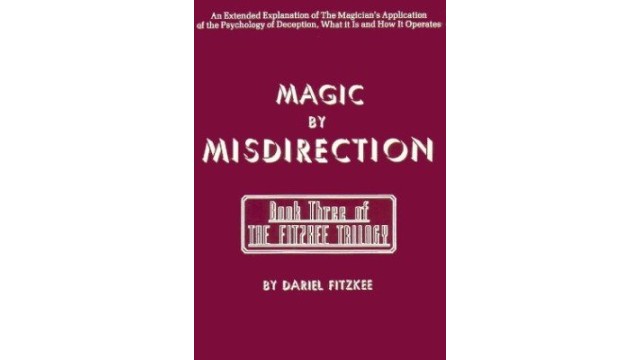
-160x90.jpg)








